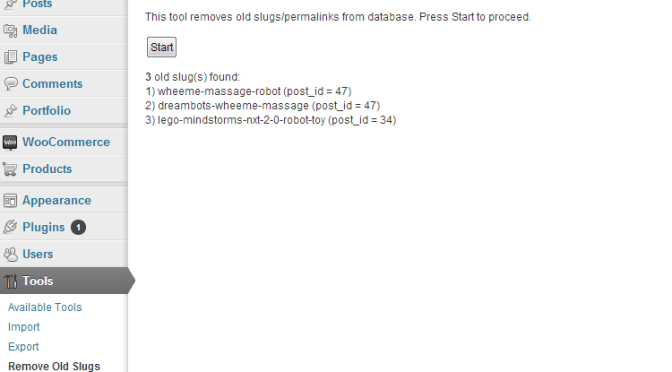Slugs Manager: Removing Old Permalinks From Your WordPress Database

Executive Summary

Cleaning up your WordPress database can significantly improve your site’s performance and user experience. One common issue is the accumulation of old permalinks, which can clutter your database and create conflicts. This article will guide you through the process of effectively removing old permalinks using the Slugs Manager plugin. We’ll cover the reasons why you should clean up your database, explore the benefits of using Slugs Manager, and provide step-by-step instructions to ensure a smooth and successful operation.

Introduction
Maintaining a clean and efficient WordPress database is crucial for optimal website performance and SEO. Over time, your database can accumulate unnecessary data, including outdated permalinks, which can lead to slow loading times and even broken links. Slugs Manager is a powerful tool that helps you manage and remove these old permalinks, simplifying your database and improving your site’s overall health.
What is Slugs Manager?
Slugs Manager is a free WordPress plugin that allows you to easily identify and remove old permalinks from your database. It provides a user-friendly interface to manage your permalink structure and eliminate any outdated or conflicting entries. By removing these old permalinks, you can improve your website’s speed, reduce the chances of broken links, and enhance your overall SEO performance.
FAQs
- Q: Why should I remove old permalinks?
- A: Old permalinks can clutter your database and lead to slower loading times. They can also cause broken links and affect your SEO by creating duplicate content issues.
- Q: Is Slugs Manager safe to use?
- A: Yes, Slugs Manager is a safe and reliable plugin that has been used by many WordPress users. It’s important to back up your database before using any plugin that modifies your data.
- Q: Can I use Slugs Manager with any WordPress theme or plugin?
- A: Yes, Slugs Manager is compatible with all WordPress themes and plugins. It operates independently of your theme or plugin setup and focuses solely on managing your permalinks.
The Need for Cleaning Up Your Database
Your WordPress database is like the heart of your website. It stores all the essential data that powers your site, including posts, pages, comments, and user information. Over time, your database can become cluttered with unnecessary data, such as old permalinks, which can negatively impact your website’s performance.
- Improved website speed: A cluttered database can slow down your website loading times, making it frustrating for visitors. Removing old permalinks can help to streamline your database and improve your site’s performance.
- Reduced broken links: Old permalinks can lead to broken links, as users might try to access content that has been moved or deleted. This can result in a negative user experience and potentially damage your SEO.
- Enhanced SEO performance: A clean database with optimized permalinks can improve your SEO ranking. Search engines can crawl your website more effectively when your database is free of clutter and your permalinks are structured correctly.
- Reduced database size: Removing old permalinks can reduce the overall size of your database, making it easier to manage and reducing server resource usage.
Identifying and Removing Old Permalinks
Slugs Manager provides a simple and effective way to identify and remove old permalinks from your database. It allows you to scan your database for outdated permalinks and easily delete them without affecting your current website structure.
- Scanning for old permalinks: Slugs Manager offers a powerful scanning tool that helps you identify old permalinks that are no longer associated with any content. The plugin can scan your entire database for unused permalinks, ensuring a thorough cleanup.
- Previewing the results: Before deleting any permalinks, you can preview the results of the scan to see which permalinks will be removed. This step allows you to ensure that no crucial links are accidentally deleted.
- Removing old permalinks: Once you’re satisfied with the preview, you can proceed to remove the old permalinks. Slugs Manager provides a simple button to delete all the selected permalinks from your database.
- Keeping a log of removed permalinks: For your records, Slugs Manager keeps a log of all the permalinks that have been removed. This log allows you to track your cleanup process and easily revert any deletions if needed.
Managing Permalinks Structure
Slugs Manager is not just about removing old permalinks; it also provides tools for managing your permalink structure. This includes the ability to create custom permalinks and optimize your permalink settings to ensure your website is properly structured.
- Customizing permalinks: You can easily create custom permalinks for individual posts and pages, giving you more control over the URLs displayed on your site. This feature is particularly useful for creating SEO-friendly URLs.
- Changing the permalink structure: Slugs Manager allows you to modify your site’s overall permalink structure without affecting your existing content. You can switch between different formats like post name, date-based, or numeric, ensuring your website’s URLs are consistent.
- Redirecting old permalinks: When you change your permalink structure, you can use Slugs Manager to create redirects for old permalinks to avoid broken links. This ensures that visitors who access your site using old URLs are redirected to the correct content.
- Monitoring permalink changes: Slugs Manager keeps track of any changes made to your permalink structure, allowing you to revert to previous settings if needed.
Utilizing the Plugin’s Powerful Features
Slugs Manager comes with advanced features that make it a comprehensive tool for managing your permalink structure. These features include the ability to bulk edit permalinks, export and import permalink data, and manage redirects.
- Bulk editing permalinks: You can edit multiple permalinks simultaneously, making it easy to adjust your website’s structure in bulk. This feature can be very helpful when you need to update numerous permalinks at once.
- Exporting and importing permalink data: You can export your permalinks to a CSV file, allowing you to backup your permalinks or transfer them to a different website. You can also import permalink data from a CSV file to quickly set up your permalink structure on a new website.
- Managing redirects: Slugs Manager allows you to create redirects for individual pages or posts. This is useful for creating redirects for old pages or posts that are no longer available, ensuring that users are directed to the correct content.
Conclusion
Maintaining a clean and efficient WordPress database is essential for optimal website performance and SEO. Slugs Manager is a valuable tool that empowers you to manage your permalink structure effectively. By removing old permalinks, customizing your permalinks, and optimizing your website’s structure, you can improve your website’s speed, reduce broken links, and enhance your SEO ranking. Whether you’re a beginner or an experienced WordPress user, Slugs Manager is an indispensable plugin for optimizing your WordPress database and creating a more user-friendly and SEO-friendly website.
Keyword Tags
- WordPress
- Database Optimization
- Permalink Management
- Slugs Manager Plugin
- SEO Optimization
I'm not sure I understand this. Can someone explain it in simpler terms?
This is a very useful article. I'm going to try this out on my website.
I've been using this method for years and it works like a charm.
I'm not sure if this is the best way to do it. There might be other methods that are more efficient.
This is so complicated! Why can't WordPress just do this automatically?
This is the best article I've ever read about WordPress. I'm going to bookmark it for future reference.
This is a great article! I was having trouble with old permalinks and this helped me fix it. Thanks!
I'm so glad I read this article. Now I can finally get rid of all those old permalinks!
This is a waste of time. I've never had any problems with old permalinks.
This is a great article! But I'm sure someone will find a way to make it even more complicated.
I'm sure this will come in handy someday. I'm just not sure when that day will be.